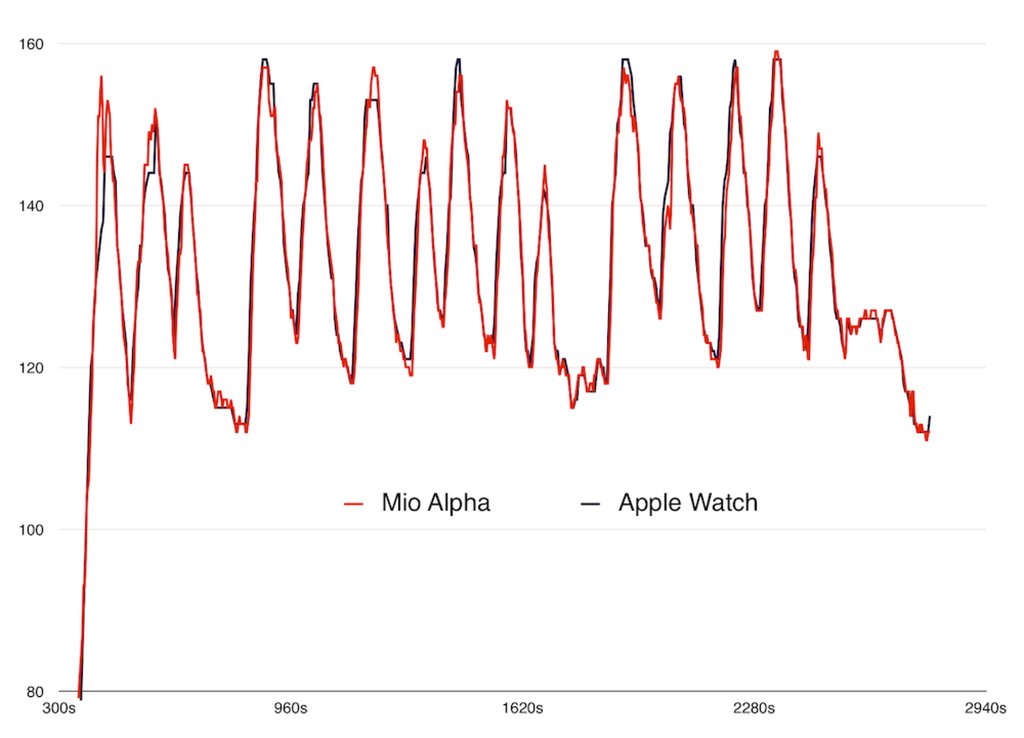The heart rate sensor in the Apple Watch is nearly on par with Mio's Alpha, a popular dedicated heart rate tracker also worn on the wrist, a new comparison of the two devices has found.
A graph showing a comparison of the devices, shared Wednesday by Mac and iOS developer Brad Larson, comes from raw data extracted from HealthKit after a recent run with both devices. The Alpha produced sharper peaks, which may suggest more filtering on the Watch, but in most cases the data produced was essentially equal.
The two wearables each use optical sensors that measure reflected light to gauge blood flow. Larson noted that the sensor on the Watch takes a reading every 5 seconds while in workout mode, slowing to once every 10 minutes while in regular use.
Apple recently encountered some controversy with the sensor when it confirmed that the Watch may not work properly for people with wrist tattoos, a consequence of using optical technology. The company changed a support page to state that the "ink, pattern, and saturation" of some tattoos can make it "difficult to get reliable readings."
In practice some people have found they were effectively unable to use the Watch without disabling wrist detection, which relies on the heart rate sensor. Turning the feature off also disables Apple Pay, and tattooed people may have to buy a separate tracker to get an accurate heart rate.
 Roger Fingas
Roger Fingas








 Marko Zivkovic
Marko Zivkovic
 Christine McKee
Christine McKee
 Andrew Orr
Andrew Orr
 Andrew O'Hara
Andrew O'Hara
 William Gallagher
William Gallagher

 Mike Wuerthele
Mike Wuerthele
 Bon Adamson
Bon Adamson




-m.jpg)



50 Comments
Need to compare it to actually medical grade heart monitor, do not compare it another consumer grade device. Also you do not know what the Apple iOS health kit software is doing with the data before it actually records it. I would be curious how well it tracks against a medical grade device.
[quote name="Maestro64" url="/t/186173/apple-watchs-heart-rate-sensor-on-par-with-mios-dedicated-alpha-monitor#post_2721060"]Need to compare it to actually medical grade heart monitor, do not compare it another consumer grade device. Also you do not know what the Apple iOS health kit software is doing with the data before it actually records it. I would be curious how well it tracks against a medical grade device.[/quote] As the Apple device specifically isn't a medical grade I. e. certified, medical device what would be the point?
What's the point in comparing it to the same tech (implemented in the same way)? How about battery life (compared to the same tech)? In regards to tatoogate, how does the Mio perform (same tech, same results)?
[quote name="Maestro64" url="/t/186173/apple-watchs-heart-rate-sensor-on-par-with-mios-dedicated-alpha-monitor#post_2721060"]Need to compare it to actually medical grade heart monitor, do not compare it another consumer grade device. Also you do not know what the Apple iOS health kit software is doing with the data before it actually records it. I would be curious how well it tracks against a medical grade device.[/quote]Say what? Contrary to the views expressed in this diatribe, it is a very good thing to know that the Apple Watch gives essentially the same results as a dedicated consumer-grade heart rate monitor. Would it be a good thing to also compare the Apple Watch to a medical grade monitor? Of course it would. However, that is not the point. Knowing that the Watch gives essentially the same results as the dedicated consumer monitor means that the Watch can replace the dedicated consumer monitor. If however the patient is using a medical grade monitor, then it is not likely that the medical grade monitor will be replaced. The Government has stated that it will maintain a light regulatory hand on the medical applications of the Apple Watch. However, this does not mean that it is "Katy, bar the door." Neither Apple nor a third-party developer will be permitted to promote or sell an app that rivaled the results of a dedicated monitor without first going through a rigorous certification protocol.
In regards to tatoogate, how does the Mio perform (same tech, same results)?
Good point. I'm also curious if the Mio samples at the same intervals as the ?Watch. The OP indicates that the "watch", which I presume is the ?Watch only, measures every 5 seconds during a workout, and every 10 minutes normally. One other complaint is that it takes a while to take the reading on the watch and offer results, it's not "real time", even sending the personal "heartbeat" feature appears to use the last recorded heartbeat, and not what a person is experiencing the moment they send it. I presume the Mio works the same way.